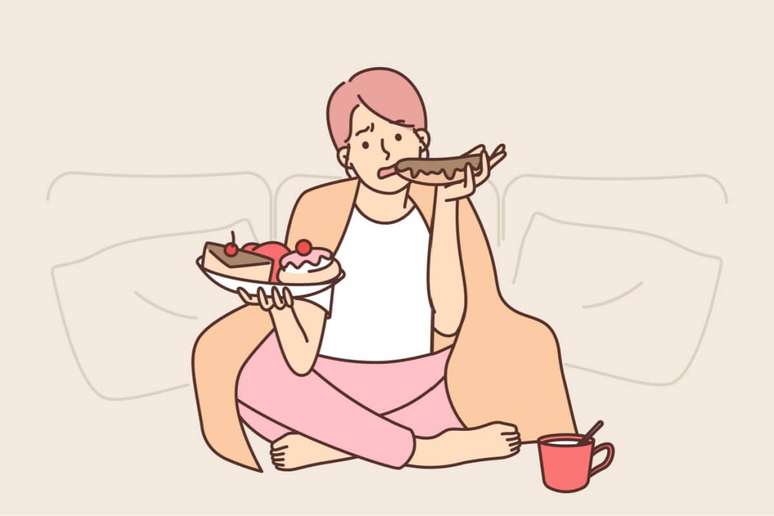Understanding this connection can help develop more effective approaches to treatment.
Binge eating is a disorder characterized by excessive and uncontrolled food intake, accompanied by feelings of guilt and shame. This behavior can have a significant impact on the physical and emotional health of individuals, negatively affecting their well-being and quality of life.
The signs of this disorder can vary, but often include repeated episodes of excessive eating in a short period of time, even when you are not truly hungry. Other symptoms include a feeling of lack of control during these meals, eating in secret, and subsequent feelings of guilt. Additionally, binge eating may be associated with mood swings and stress, among other emotional problems.
Treatment for binge eating
Maria Eduarda De Musis, a psychiatrist and professor of Medicine at Unic Beira Rio, emphasizes that the treatment of binge eating must be multidisciplinary and personalized to meet the specific needs of each individual.
“Interventions may include cognitive behavioral therapythat helps identify and change patterns of thinking and behavior related to food. Consulting with a specialist can offer guidance on a balanced diet and strategies to improve the relationship with food,” he emphasizes. In some cases, you may consider using medications to treat associated symptoms, such as depression or anxiety.
Neural Cells and Binge Eating
The action of compulsion goes well beyond food intake, the doctor explains. “The relationship between nerve cells and binge eating is significant but complex, involving the interaction of multiple systems in the brain. Nerve cells, or neurons, play a central role in regulating eating behavior, influencing both the physiological and emotional aspects of eating,” he explains.
Next, the psychiatrist highlights three relationships between neural cells and binge eating:

1. Reward and pleasure systems
Neurons in the brain’s reward system, which includes areas such as the nucleus accumbens and the dopamine system, are heavily involved in binge eating. These neurons respond to pleasurable stimuli, such as eating food, by releasing neurotransmitters such as dopamine.
When food is associated with a pleasant reward, a cycle of compulsive behaviors can occur in which the person repeatedly seeks this pleasure, even at the expense of their health or the actual need for food.
2. Appetite regulation and inhibitory control
Other groups of neurons, located in areas of the brain such as the hypothalamus and amygdala, are involved in regulating appetite and controlling emotional responses associated with eating. The hypothalamus, for example, is responsible for balancing hunger and satiety signals, while the amygdala is related to emotional responses and stressDysfunctions in these areas can lead to difficulty controlling the urge to overeat, resulting in binge eating episodes.
3. Interaction with emotional aspects
Binge eating is often linked to emotional and psychological factors. Neurons that regulate stress and emotions can influence a person’s relationship with food. For example, feelings of anxiety, depression, or stress can trigger disordered eating behaviors as a form of self-medication, where the act of eating becomes a way of coping. negative emotions.
Binge eating is influenced by complex interactions between neural systems responsible for reward, appetite regulation, and emotional control. Understanding this relationship can help develop more effective approaches to treating and reversing an eating disorder.
By Camila Souza Crepaldi
Source: Terra
Ben Stock is a lifestyle journalist and author at Gossipify. He writes about topics such as health, wellness, travel, food and home decor. He provides practical advice and inspiration to improve well-being, keeps readers up to date with latest lifestyle news and trends, known for his engaging writing style, in-depth analysis and unique perspectives.








